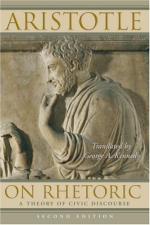
|
| Name: _________________________ | Period: ___________________ |
This quiz consists of 5 multiple choice and 5 short answer questions through Book III, Chapter 10-12.
Multiple Choice Questions
1. As discussed by Aristotle, how many modes of persuasion did rhetoric use?
(a) Two.
(b) Five.
(c) Three.
(d) Four.
2. Which one of the following was mentioned by Aristotle as a way that anger was useful in oratory?
(a) To enhance the effect of the speaker's argument.
(b) To give credibility to the speaker.
(c) To diminish the effect of an opposing argument.
(d) To give authority to the speaker.
3. According to Aristotle, what was the general difference between enthymemes and examples?
(a) Neither enthymemes nor examples were persuasive.
(b) Examples were more persuasive than enthymemes.
(c) Enthymemes were more persuasive than examples.
(d) Both enthymemes and examples were just as persuasive.
4. As explained by Aristotle in Book I, Chapter 10, what was the concern of the legal rhetorician?
(a) Only proving wrongdoing.
(b) Only disproving wrongdoing.
(c) Neither proving nor disproving wrongdoing.
(d) Either proving or disproving wrongdoing.
5. According to Aristotle, how many ways could objections be raised?
(a) Four.
(b) Two.
(c) Five.
(d) Three.
Short Answer Questions
1. In Aristotle's opinion, why should political rhetoric focus the most on sound argumentation?
2. Why did Aristotle think the completion of a difficult task was pleasant?
3. How many periods of a lifetime did Aristotle discuss in Book II, Chapter 12?
4. What explanation of justice did Aristotle provide?
5. Concerning the elicitation of the praise or blame of an audience, what was epideictic rhetoric also called by Aristotle?
|
This section contains 311 words (approx. 2 pages at 300 words per page) |

|




